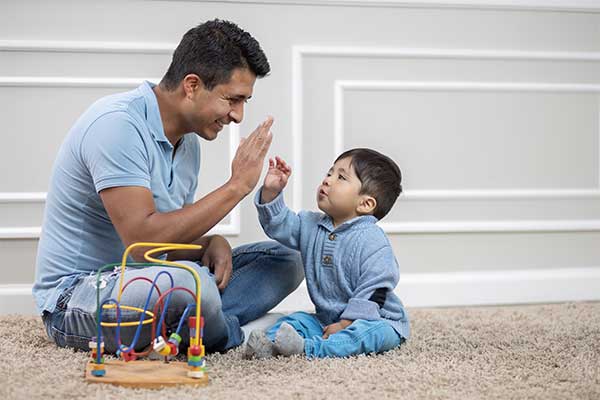Parental care is a cornerstone of a child’s development, and both maternal and paternal roles play unique and vital parts in nurturing and shaping young lives. While maternal care has traditionally received more attention, research and understanding of paternal care have been growing, highlighting its essential role in a child’s physical, emotional, and cognitive well-being. The involvement of fathers in raising children has profound effects on their development, relationships, and future success. In this article, we delve into the importance of paternal care for kids and explore how fathers contribute to their children’s growth and overall development.
- A Shift in Perspectives:

Historically, the primary caregiving role has often been associated with mothers, while fathers were considered more as breadwinners. However, societal changes and shifts in family dynamics have led to a reevaluation of these traditional roles. Today, there is a greater recognition of the significant impact fathers have on their children’s lives.
- Emotional Development

Paternal care has a unique way of contributing to a child’s emotional development. Fathers offer a distinct style of interaction that complements maternal nurturing. They often engage in more playful and physically stimulating activities, promoting a sense of exploration, risk-taking, and independence. Fathers’ involvement in playtime helps children develop emotional resilience, self-control, and problem-solving skills.
- Cognitive Development

Fathers play a critical role in fostering cognitive development. Their interactions with children often involve introducing them to new experiences, ideas, and challenges. This exposure broadens a child’s perspective, stimulates curiosity, and enhances cognitive skills such as critical thinking and creativity. The involvement of fathers in educational activities and conversations can have a lasting impact on a child’s intellectual growth.
- Social Skills and Relationships

Paternal care contributes significantly to the development of a child’s social skills and ability to form relationships. Fathers teach children about communication, empathy, and conflict resolution through their interactions. Their presence provides a different model of interpersonal behavior, allowing children to learn diverse ways of relating to others.

- Gender Roles and Identity

Fathers influence the development of children’s gender roles and identities. A positive and involved father figure can promote a healthy understanding of masculinity and femininity, encouraging respect and equality. Daughters with engaged fathers tend to have higher self-esteem and confidence, while sons learn about empathy and emotional expression.
- Academic Achievement

Fathers who actively participate in their children’s education have a positive impact on academic achievement. Their support, encouragement, and involvement in homework and school-related activities contribute to better grades, higher motivation, and a more positive attitude toward learning.
“Dads share wisdom with their children in the hopes they spread it throughout the world.”
- Emotional Well-Being

Research shows that children who experience positive paternal care tend to have better emotional well-being. Fathers who help a nurturing and supportive environment children develop emotional regulation skills, reducing the risk of anxiety, depression, and behavioral problems later in life.
- Positive Role Models

Fathers serve as important role models for their children. Observing their fathers’ behaviors, attitudes, and values helps children form their own moral compass and ethical principles. Fathers who exhibit qualities like responsibility, integrity, and resilience set a powerful example for their children to follow.
Visit: how to travel with infants
- Building Resilience

Fathers’ involvement can contribute to building resilience in children. Interactions with fathers often involve challenges and overcoming obstacles, teaching children to cope with setbacks, adapt to changes, and persevere in the face of difficulties.
- Single Fathers and Co-Parenting

The importance of paternal care is not limited to traditional family structures. Single fathers and fathers who co-parent play crucial roles in their children’s lives. Their involvement contributes to stability, emotional support, and a sense of security for the child.
- Balancing Work and Family

In the modern world, the balance between work and family life can be challenging. However, fathers who prioritize spending quality time with their children create strong bonds and a nurturing environment. Effective time management and conscious efforts to engage in shared activities help strengthen the father-child relationship.
- Communication and Connection

Effective communication and emotional connection are fundamental to paternal care. Building strong relationships with children involves active listening, open dialogue, and spending quality time together. Fathers who prioritize communication and create a safe space for expression foster trust and a deeper bond with their children.
- Parenting Resources and Support

Fathers may sometimes feel isolated or lack access to resources and support networks. Connecting with other fathers, attending parenting workshops, and seeking guidance from professionals can provide valuable insights and strategies for effective paternal care.
- Nurturing Father-Child Relationships

Fathers have a unique opportunity to foster strong emotional connections with their children. Engaging in shared activities, expressing affection, and offering consistent emotional support help create a foundation of trust and intimacy. Fathers who actively participate in caregiving tasks like feeding, diaper changing, and bedtime routines contribute to the overall well-being of their children.

- Long-Term Impact

The effects of paternal care extend beyond childhood. Research indicates that fathers who are involved and nurturing have a lasting positive impact on their children’s adulthood. These individuals tend to have healthier relationships, higher self-esteem, and a greater sense of well-being.
- Supporting Fathers’ Mental Health

Recognizing the importance of fathers’ mental health is vital for effective paternal care. Fathers, like mothers, may experience stress, anxiety, and emotional challenges. Seeking professional help and practicing self-care is essential for maintaining mental well-being, which, in turn, contributes to better parenting.
- Embracing Diversity

It’s important to acknowledge that fathers come from diverse backgrounds, cultures, and family structures. The definition of paternal care may vary, and what matters most is the genuine love, commitment, and effort fathers invest in their children’s lives.
Visit: advice for new dads
Conclusion
Paternal care is a vital and integral component of a child’s development. Fathers play a unique and invaluable role in nurturing emotional, cognitive, and social growth. The importance of paternal care for kids cannot be overstated; it contributes to well-rounded individuals who are equipped with the skills, values, and confidence needed to navigate the complexities of life. As society continues to evolve, embracing and encouraging the active participation of fathers in caregiving is essential for promoting the holistic development and success of the next generation.

